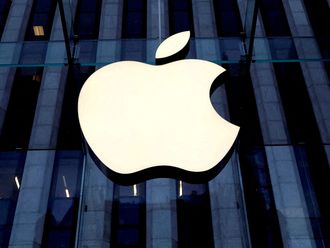
Dubai: Nothing grates Narain Jashanmal more than having people say: "It's the end of the world for the [traditional] book business!" These days it is kind of hard to escape the sweeping generalisations pertaining to the buying and selling of books in traditional bookstores in the shadow of the looming e-reader.
Probably, Jashanmal's title has got something to do with people becoming animated about the end of days for the book business. He is the general manager for the books and magazines division of the highly diversified Jashanmal Group, a blue ribbon among GCC based family-owned businesses. The division that he heads represents 15 per cent of the group's top-line numbers and maintains optimum growth numbers.
But Jashanmal never loses his poise in articulating what he believes is the future of bookselling in the Gulf and how his business intends to set the pace.
GULF NEWS: So, is the traditional way of selling books a thing of the past?
Narain Jashanmal: The global book industry is certainly going through an evolution and this is an evolution that began when Amazon launched its services. On a very broad level and leaving aside e-books, the sale of books per se are stable or growing.
Unit levels are up and value-wise could probably be stable. How people buy their books and where they buy is changing extremely rapidly. But people are still buying books in the developed markets and more of them are buying online.
But aren't the patterns getting replicated in the Gulf?
The UAE's book business in the last decade has seen a complete transformation. The landscape of the business has changed.
A couple of independent players who had one or two outlets became mini-chains, and people franchised global names. And then we had one dominant player in the category, Kinokuniya, opening a tremendously large store. From a GLA (gross leasable area) point of view, there has been a huge increase in a short period.
Is there any overlap between Jashanmal's department stores and standalone bookstores?
We don't sell books in our department stores. The last time we did it was in the late 1980s when we had a books area within the department store in Wafi Mall. The only one we still maintain is the department store in Bahrain, but at the same time we have two substantial standalone bookstores in Al Seef and Bahrain City Centre.
One has to pick one's opportunities very carefully. We opened a store in Al Ghurair in April and we took a conscious decision to develop a new concept called Jashanmalbooks.com.
The idea is to have a consistent image for all our stores, including the existing ones. Between now and next summer we should complete it.
Some would say adding to your bookstore network could be pretty tricky these days.
We are in a slightly unique position insofar as we are the largest importer of newspapers and magazines in the region. We have a pretty significant book wholesaling business and we supply to all the majors.
That gives us some economies of scale in terms of purchasing power, etc. In magazine distribution, we still see some more growth to be had in some segments. Specialist magazines and anything to do with technology could provide that. We are seeing huge growth being driven by technology-led titles.
But how does that apply when it comes to selling books?
It's not just about the transactional component. A large part of what bookstores have to do going forward is discovering.
There's something in the neighbourhood of 1.8 million titles in print. No bookstore can attempt to carry that many. We stock about 20,000 titles at the Mall of the Emirates store, which is 5,000 square feet. Ideally we are looking for slightly smaller stores; our ideal space would be 2,000 to 3,000 square feet. That allows us to concentrate on our core categories without having to supplement too much with additional categories.
But aren't book buyers increasingly turning to online formats for the sheer ease of use they offer?
There are many ways a buyer arrives at a decision to go for a particular title. There are the big tent-pole titles if their publishers are pushing them with global marketing. They bubble up to the top and reach readers in a variety of ways. These are books that find the stores.
But how many people actually find what they are looking for? Part of it is word of mouth and part of it is going to a physical store and browsing around.
Increasingly, it's going online or going to Google, or looking through Facebook. That's only going to increase and it's important for us to put Jashanmalbooks.com into our names.
The first part of it was making sure we were online. If you Google bookstores in Dubai, you will find us. If you Google for any of the top 2,000 offers in Dubai, you will find us.
That was the first phase of becoming jashanmalbooks.com from Jashanmal bookstores. Whether it's on Facebook or LinkedIn or Google, if you are interested in books you should be able to find us.
Is it still a work in progress?
The great thing about online advertising is that it gives you quite a lot of insight into how people find you — was it by clicking on a display ad, how many times did they see the display ad before clicking, etc.
We tried a lot of things to see where the engagement was and what the conversion rates were. We analysed how much should be spent on our digital marketing in a month to generate a certain amount of traffic for both the physical and online stores.
To get people to go to your own site is reasonably expensive. Either you have to do a lot of traditional above-the-line marketing or you have to have some way of getting your name in front of people in the first place, which for us are our stores and some of the activities we do.
The more important part for me was to be visible within search engines. When someone comes to our site they don't necessarily go to our home page.
They may go directly to a product page or they may go directly to the store location page. That's value creation for me.
But what about pulling in traffic on to your own site?
As important as it is to get traffic on our home page, it's more so to provide the information they are looking for. A lot of our activities have been geared towards that.
Since January we have had a store on Souq.com for people who want to complete the loop and buy online.
We got 7,500 titles on there at the moment. The initial results are encouraging enough for us to believe we are on the right track.
With the gift-giving season coming up, we are working on a book recommendation application.
If you are looking to buy something for yourself or for a friend, what this allows you to do is log in with the Facebook credentials, you select the friend you are buying for and then answer a few simple questions about that person.
Based on that, recommendations are given from the books we have in stock. Facebook is where we are going to see a lot of traffic going with this application.
If you want to buy on Facebook.com, you can do that too. This will allow us to market directly within Facebook, complete the transaction and get the rich customer data when people engage with you on the portal. That's social commerce.
It's in the fourth week of development and should go live within the next few weeks.
Titles lined up on e-cards
The book retailing arm of Jashanmal Group is in the home stretch of its plans to offer digital versions and the device that will enable it. It plans to bring in an e-reader from a third-party vendor and offer titles on e-cards.
Simultaneously, the digital approach will also allow Jashanmal to reach out to book enthusiasts through e-pdfs and e-pub formats that can be read on other platforms such as iPads.
"We are looking at a couple of vendors for the e-reader; to have your own device only makes sense if you are doing it at the global level or if you have a very large market base or installed user base," said Narain Jashanmal.
"The way we plan to do it, the numbers will be smaller, but the risk associated will be a more calculated one. It will seed the market with devices, see if the people are buying or not.
"It's a good hybrid solution; I am under no illusion that it will last forever. But at this stage, it's a fairly viable one. We are building our platforms with some future-proofing in it."
And the launch schedule for the digital versions? "This is the challenge we are facing — the time to deploy," said Jashanmal. The first quarter next year seems likely, he said.












